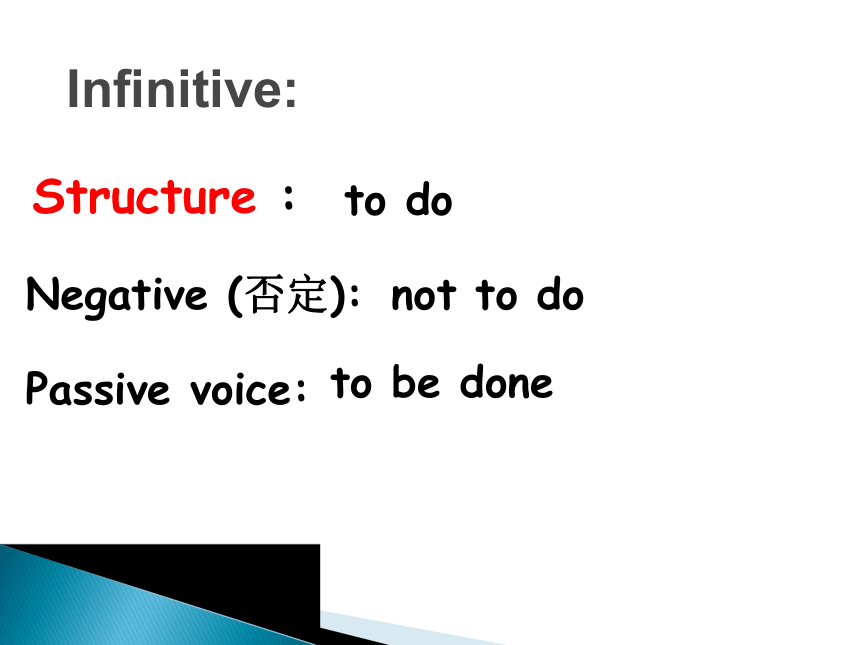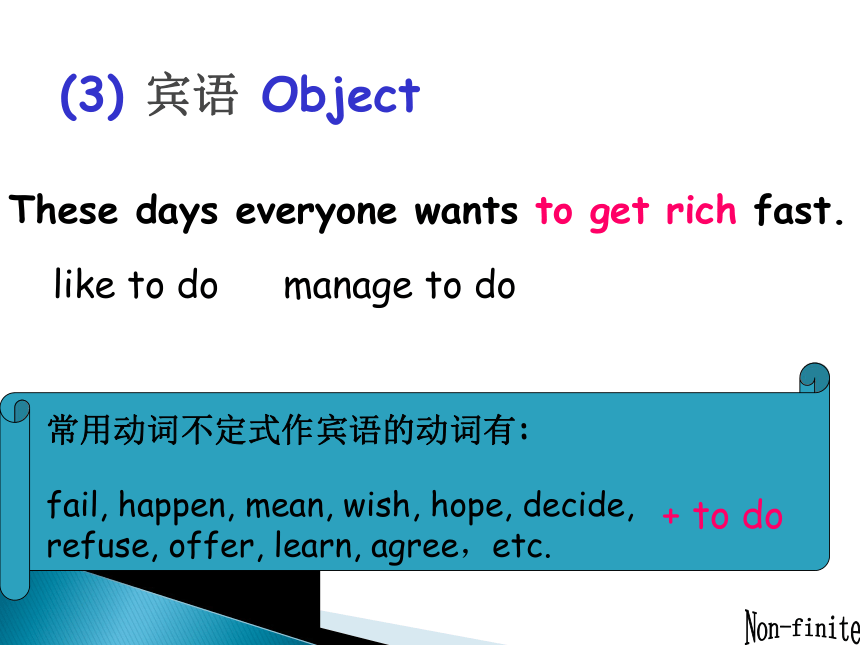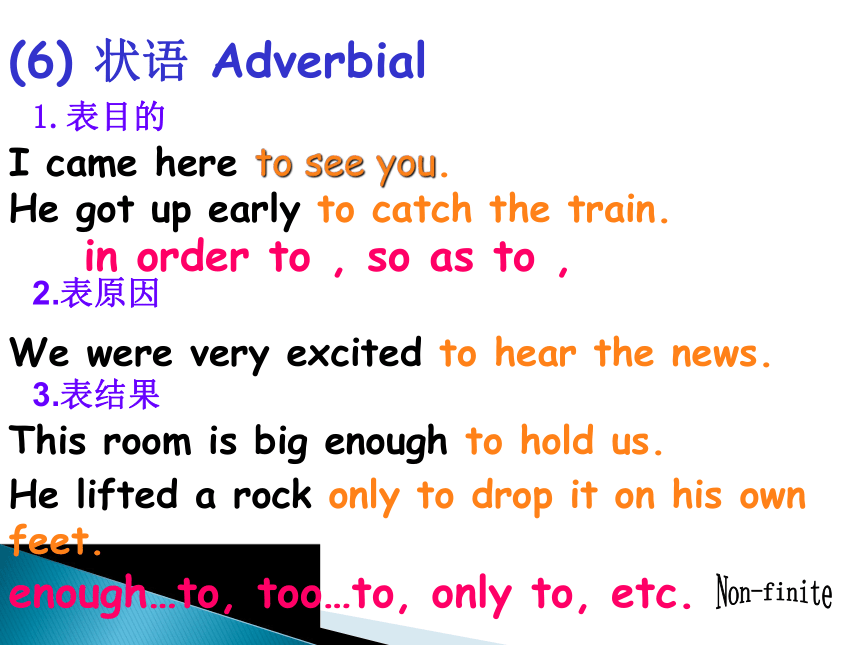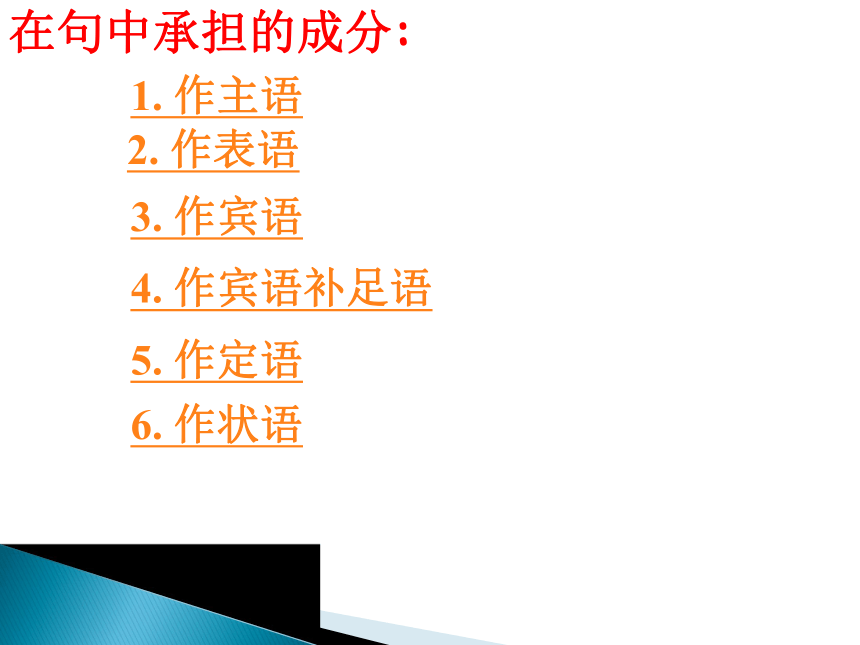新概念英语第三册语法非谓语动词课件(共62张PPT)
文档属性
| 名称 | 新概念英语第三册语法非谓语动词课件(共62张PPT) |

|
|
| 格式 | ppt | ||
| 文件大小 | 3.8MB | ||
| 资源类型 | 教案 | ||
| 版本资源 | 新概念英语 | ||
| 科目 | 英语 | ||
| 更新时间 | 2023-06-23 15:33:02 | ||
图片预览












文档简介
(共62张PPT)
Infinitive 不定式
Gerund 动名词
Participle 分词
Structure :
to be done
Infinitive:
to do
Negative (否定):
not to do
Passive voice:
(1). 主语 Subject
不定式作主语时,往往放在谓语之后,
用it作形式主语.
To get enough sleep at night is important.
It____________________________________.
It is adj. (for sb) to do sth.
It is + a pleasure/an honor/a pity to do.
It takes sb +time to do.
is important to get enough sleep at night
(2). 表语 Predicative
My job
is
Your task ______________(努力学习).
is to study hard
To see is to believe.
to teach you English.
These days everyone wants to get rich fast.
(3) 宾语 Object
常用动词不定式作宾语的动词有:
fail, happen, mean, wish, hope, decide, refuse, offer, learn, agree,etc.
+ to do
like to do
manage to do
The teacher told me to clean the blackboard.
(4). 宾补 Complement
五看
watch
see
look at
observe
notice
三使
let
make
have
二听
listen to
hear
一感觉:
feel
当遇到下列动词时,不定式省略to:
allow, cause, ask, advise, expect, force, permit,
persuade, tell, want, warn, teach等.
医生建议他去南方.
The doctor advised him to go to the south.
+ sb to do
I made him do his work.
He ______________________by me.
See sb do sth
---
sb be seen to do
He was seen ___ from the tree and get hurt.
fall B. to fall C. falling D. fallen
改错: He was heard talk to his mother for
an hour.
to talk
was made to do his work
(5). 定语 Attributive
(如果不定式中的动词是不及物动词,
则不定式中要有介词.)
He is looking for__________.(一间可以住的房子)
There is nothing___________.
*我想要几本书在旅途中看。
I’d like________________________________.
a few books to read during the journey
---What do you think of the school
---It is a very good _____.
A. school to study in B. school for children to study
C. studying school D. school to study
to worry about
The topics to be discussed at tomorrow’s meeting is concerned about the Olympics 2008.
(没有什么可担心的)
a room to live in
I came here to see you.
He got up early to catch the train.
(6) 状语 Adverbial
in order to , so as to ,
1.表目的
2.表原因
We were very excited to hear the news.
3.表结果
This room is big enough to hold us.
enough…to, too…to, only to, etc.
He lifted a rock only to drop it on his own
feet.
1. 作主语
2. 作表语
3. 作宾语
4. 作宾语补足语
5. 作定语
6. 作状语
在句中承担的成分:
主动语态 被动语态
进行式
完成式
完成进行式
Tense and Voice (时态与语态)
to be doing
to have done
to have been
done
----------
to have been
doing
----------
(1).They pretended not to see us.
(2). He pretended to be sleeping.
(3).She pretended to have known it before.
(一般式表示与谓语的动作同时/发生在它之后.)
(在谓语动词发生的同时,不定式的动作也正在进行)
(完成式表示动作发生在谓语动作之前)
who, which, when, how, what,whom,whether 等连用,在句中起名词作用,可充当主语、表语、宾语等。
我不知道是否要接受邀请。
I don’t know whether to accept the invitation or not.
(宾语)
How to solve the problem is very important.
(主语)
如何解决这个问题很重要。
我的问题是什么时候开始。
My question is when to start.
(表语)
不定式与疑问词连用:
关于省略
(1).不定式中的动词上文已出现过,下文要
省略该动词.
e.g.: Would you like to go with me
(2). 不定式是to be 结构, be 不可省.
e.g.: Would you like to be a teacher
A. I’d like to B.I’d like to go
Yes, _______.
A.I’d like to be. B. I’d like to.
Yes,______.
(eat, give up, finish, explain, tell)
1.My teacher was made _______ his teaching because of poor health.
to give up
explaining/to be explained
to be finished
not to eat
3.We find it impossible for the work
__________ ahead of time.
4.The patient was warned ______ oily food
after the operation.
2.The sentence wants________________
once more.
5.I meant _________ you about it, but I forgot to do so.
to have told
1. --I usually go there by train.
--Why not ____ by boat for a change
A. to try going B. trying to go
C. to try and go D. try going
2.Rather than ___ on a crowded bus, he always prefers ____ a bicycle.
A. ride; ride B. riding; ride
C. ride; to ride D. to ride; riding
4. She can’t help ____ the house because she’s busy making a cake.
A. to clean B. cleaning
C. cleaned D. being cleaned
3. While shopping, people sometime can’t help ____ into buying something they don’t really need.
to pursue B. persuading
C. being persuaded D. be persuaded
5. Robert is said ____ abroad, but I don’t know what country he studied in.
to have studied B. to study
C. to be studying D. to have been studying
6. The purpose of new technologies is to make life easier, ____ it more difficult.
not make B. not to make
C. not making D. don’t make
7. Having a trip abroad is certainly good for the old couple, but it remains ____ whether they will enjoy it.
to see B. to be seen
C. seeing D. see
8. The mother didn’t know ____ to blame for the broken glass as it happened while she was out.
A. who B. when C. how D. why
9. Paul doesn’t have to be made ____. He always works hard.
learn B. to learn
C. learned D. learning
10.—The light in the office is still on.
--- Oh, I forgot ______.
turning it off B. turn it off
C. to turn it off D. having turned it off
11. I would love ____ to the party last night but I had to work extra hours to finish a report.
A. to go B. to have gone
C. going D. having gone
12. I’ve worked with children before, so I know what ____ in my new job.
A. expected B. to expect
C. to be expecting D. expects
13. Little Jim should love ____ to the theatre this evening.
A. to be taken B. to take
C. being taken D. taking
14. The teacher asked us ____ so much noise.
A. don’t make B. not make
C. not making D. not to make
不定式作定语时,应放在被修饰词的后面,而且放在其他后置定语之后。
1. 不定式做定语与所修饰的词之间有三种关系:
(1)动宾关系
I have a lot of work to do.
(2)主谓关系
He is always the first to come.
(3)同位关系
We all have a chance to go to college.
固定句型:
had better+ (not) do sth. 最好(不)做某事
Why (not) do sth.
…prefer to do/prefer doing
…prefer + n./doing A +to + n./doing B
…prefer + to do A rather than (to) do B
…would rather (not) do sth.
…would rather do A than (do) B
…would rather + 句子(过去式)
(虚拟语气) 要做……
*在the first, the second…,the last和only之后,只能用to do。
如:He was the last to leave the classroom .
*如果understand,realize, know用在begin, start, attempt, intend后,只能用to do。
如:I began to understand the truth.
*表示目的的不定式的否定式一般不用not to do,而用in order not to do或so as not to do。
如:(√)In order not to be seen, he came into the room through the window.
(×)Not to be seen, he came into the room through the window.
(√)He came into the room through the window so as not to be seen.
*so as to do一般不放在句首。
(√)He get up at five this morning so as to catch the early bus.
(X) So as to catch the early bus,he got up at five this morning.
My teacher was made _____ his teaching
because of poor health.
giving up B. to give up
C. give up D. given up
2.The sentence wants ____ once more.
explained B. to explain
C. being explained D. explaining
3.The Arctic is considered ____ the northern part of the Atlantic.
having been B. to have been
C. to be D. being
4.The Emperor ordered the wonderful cloth
_____ for him without delay.
to have woven B. to be woven
C. to be weaving D. to weave
5.I found the German language hard ____.
learned B. learning
C. to be learned D. to learn
6.—The light in the office is still on.
--- Oh, I forgot ______.
turning it off B. turn it off
C. to turn it off D. having turned it off
7.---How do you deal with the disagreement
between the company and the customers
---The key ____ the problem is to meet
the demand ____ by the customers.
to solving, making B. to solving, made
C. to solve, making D. to solve, made
8. ---What do you think of the school
----It is a very good _____.
school to study in
B. school for children to study
C. studying school
D. school to study
9. ---Did you get a job
--- No, I ___ , but it’s no use.
expected B. tried to
C. managed to D. planned
10.We find it impossible for the work ___
ahead of time.
to finish B. finishing
C. being finished D. to be finished
11.---I usually go to Shanghai by train.
----Why not ___ there by boat for a
change
to try to go B. try going
C. to try going D. try to go
12.___ a living, she had to work from
morning till night.
To make B. Made
C. Making D. To have made
13. I would rather starve to death than ___
for food.
beg B. begging C. begged D. to beg
14.The boy pretended ____ when his mother
entered.
reading B. to read
C. to be reading D. being read
1.To see you is glad.
=It’s glad to see you.
2.I want to see you.
3.I want him to see you.
4.My hope is to see you.
5.He is the man to see you.
6.I’m glad to see you.
7.I went to see you.
8.He went so early as to see you
9. To tell you the truth, I don’t agree with you.
10. How to solve this problem is very important.
(作主语)
(作宾语)
(作宾补)
(作表语)
(作定语)
(作原因状语)
(作目的状语)
(作结果状语)
独立成分
和疑问词连用
主动语态 被动语态
ing 一般式
完成式
一. Structure: doing
Negative: not doing
二. 时态和语态
making
having made
(不作定语)
being made
having been made
(不作定语
1. 作主语
2. 作宾语
3. 作定语
4. 作表语
Collecting information is very important to business.
1.作主语:
Seeing is believing.
e.g.
---What made him so unhappy
---____ the ticket for the football match.
Having been lost B. Lost
C. Because of losing D. Losing
Key : ________
D
Losing the ticket for the football match made him so unhappy
对着打翻了的牛奶哭是没用的。
Crying over the spilt milk is no use.
It is no use crying over the spilt milk.
类似的还有:
It is no good doing sth.
It is no use doing sth.
I enjoy learning English.
How about meeting outside the theatre
2.作宾语:
Vt.
Prep.
+
doing
admit, appreciate, deny, resist, stand, imagine, suggest, mind, finish, enjoy, keep, practise, miss, avoid, delay, excuse, escape, consider, can’t help, 等。
如:1) 你介意我在这儿抽烟吗
Would you mind my smoking here
2)这女孩被告知每天练习三个小时的钢琴.
The girl was told to practise playing the piano for three hours every day.
3) Good news keeps coming.
e.g. insist on, prevent …from, depend on, feel like, be fond of, succeed in, be proud of, excuse … for , apologize for, look forward to, object to , be used to, be opposed to, …etc.
Prep. 后通常用~ing形式作宾语.
e.g.
The boy stood still without __________ (dare) to raise his head because of ___________ (break) a vase.
daring
having broken
remember to do remember doing
forget to do forget doing
stop to do stop doing
go on to do go on doing
try to do try doing
regret to do regret doing
mean to do mean doing
①V + sb to do sth & V + doing sth
e.g. :
The doctor advised me not to go to bed too late.
Please permit me to introduce myself to you first.
You surely can't consider him to be a selfish man.
My parents forbid me to stay out after mid-night.
I allowed the children to play in my room for another five minutes.
advise/permit/allow/admit/forbid/consider doing sth.
e.g. :
The little boy admitted having broken the glass.
They shouldn't allow parking in the street ; it's too narrow.
I forbid smoking in my house.
We do not permit smoking in the office.
My hobby is collecting stamps and fishing.
His job is teaching.
What’s the difference between them
I’m fishing.
My hobby is fishing.
动名词
现在分词
a walking stick
A swimming pool
A sleeping car
区别
The walking man
The swimming girl
The sleeping boy
动名词修饰名词表示名词的功能
现在分词修饰名词表示该名词所处的状态
Tom insisted on coming to the party.
Tom insisted on my coming to the party.
我几乎无法想象peter在五天内横渡大西洋.
I can hardly imagine Peter sailing across the Atlantic Ocean in five days.
在动词或词组need, want, require, be worth, deserve, etc. 后的动名词表示被动意义:
Your composition needs improving.
Your composition needs to be improved.
The book is worth reading a second time.
The book is worthy to be read/of being read a second time.
-ing分词(以make为例 )
-ed 分词
主动语态 被动语态
一般式
完成式
主动语态 被动语态
一般式
完成式
Having made
making
being made
Having been made
made
X
X
X
由于分词具有形容词性和副词性,在句子中不能充当具有名词特征的主语和宾语.
成份
类别 主
语 宾语 定语 表语 补语 状语
现在分词 × ×
过去分词 × ×
作定语
1. The topics being discussed everywhere recently is concerned about the Olympics 2008.
to be discussed
discussed
进行
完成
将来
2. The topics ________________(discuss) at tomorrow’s meeting is concerned about the Olympics 2008.
3. The topics _______________ (discuss) at yesterday’s meeting was about the Olympics 2008.
The glass is broken.
The food smells inviting .
What he said sounds__________ (convince).
He was ___________(interest) in what he learned in Canada and he thought everything in Canada was ____________(interest).
convincing
interested
interesting
这道菜香味怡人。
Please fill in the blank with the verb given:
使…信服
类似情况还有:surprising ~surprised,
exciting ~excited,
tiring ~tired ,
disappointing ~disappointed,
encouraging ~encouraged ,
amazed ~amazing ,
bored ~boring ,
pleasing ~pleased,
astonishing ~astonished.
-ed 分词
Sb. + Link.v + -ed分词
-ing分词
Sth. + Link.v + -ing分词
人的感觉
事物本身的特点
They caught him cheating in the mid-term examination
He was caught cheating in the mid-term
examination.
You can't leave the workshop with the machine running.
1.宾语补足语
2.主语补足语
3.介词宾语补足语
Fill in the blank:
1.He was surprised to find his room thoroughly
_______.(clean)
2.Last night I saw him _______(play) the violin
with his eyes _______(shut).
“被动”
“主动”
cleaned
playing
shut
“被动”
分词作状语,修饰谓语,大多说明动作发生的背景或情景,表示时间、条件、原因、让步、伴随情况等。一般说来,这一结构的逻辑主语是主句的主语,而句子本身可与状语从句等句型转换。
4.作状语
1.When we heard the news, we jumped with joy.
= Hearing the news ,we jumped with joy.
2.When it is heated, the metal expands.
Heated, the metal expands.
3.Because he didn‘t know how to do it, he went to his father for help.
= Not knowing how to do it, he went to his father for help.
4.As they were deeply moved, the children began to cry.
= Deeply moved by the story, the children began to cry.
“主动”
“被动”
表示时间
表示原因
=
5. ________(look) out of the window, you can have a full view of the beach.
= If you look out of the window, you can have a full view of the beach.
6._______ (keep) in refrigerator, these vegetables will remain fresh.
=If they are kept in refrigerator, these vegetables will remain fresh.
表示条件
Looking
Kept
7. The children rushed out, shouting and jumping.
8. She walked out of the house, ________by her little daughter. (follow)
9. She walked out of the house, ________ her little daughter. (follow)
10. ———— (consider) as a building material, wood is not very strong.
= Although it is considered as a building material, wood is not very strong.
e、表示让步
表示方式和伴随情况
followed
following
Considered
11.The car was held up by the snowstorm, thus ______ (cause) the delay.
12.The glass fell to the ground, _____ (break) to pieces.
分词作状语时,分词前可加连词表示强调。e.g.
heated, ice can be changed into water.
When
tired ,I went on with the work.
walking in the street, I saw a road accident.
While
Though
causing
broken
1.作定语
2.作表语
4.作状语
3.作补语
分词
-ing/ -ed +主句(不强调动作先后);
Having done
Having been done
e.g.
1.Used as a means of traffic in China, the bike is very useful.
2. Having been used for many years, the bike needs repairing.
+ 主句
(强调时间先后)
分词的逻辑主语:
分词的逻辑主语一般为___________,但当分词的动作执行者和句子的动作执行者不一致时,分词前必须有自己的主语,e.g.
If weather permits, we will have a field trip.
Weather permitting, we‘ll have a field trip tomorrow .
这被称为_____________。
时间允许,我们将在去杭州的路上顺道看一下我叔叔.
Time permitting, we will visit my uncle on my way to Hangzhou.
主句的主语
分词的独立结构
*但有些分词作状语属习惯用法,分词的逻辑主语和句子的主语可以不一致。
如:Judging from the expression on his face, he had failed the driving test again.
Generally speaking ,girls are more careful than boys .
类似的还有:
Speaking of
Talking of
…
Infinitive 不定式
Gerund 动名词
Participle 分词
Structure :
to be done
Infinitive:
to do
Negative (否定):
not to do
Passive voice:
(1). 主语 Subject
不定式作主语时,往往放在谓语之后,
用it作形式主语.
To get enough sleep at night is important.
It____________________________________.
It is adj. (for sb) to do sth.
It is + a pleasure/an honor/a pity to do.
It takes sb +time to do.
is important to get enough sleep at night
(2). 表语 Predicative
My job
is
Your task ______________(努力学习).
is to study hard
To see is to believe.
to teach you English.
These days everyone wants to get rich fast.
(3) 宾语 Object
常用动词不定式作宾语的动词有:
fail, happen, mean, wish, hope, decide, refuse, offer, learn, agree,etc.
+ to do
like to do
manage to do
The teacher told me to clean the blackboard.
(4). 宾补 Complement
五看
watch
see
look at
observe
notice
三使
let
make
have
二听
listen to
hear
一感觉:
feel
当遇到下列动词时,不定式省略to:
allow, cause, ask, advise, expect, force, permit,
persuade, tell, want, warn, teach等.
医生建议他去南方.
The doctor advised him to go to the south.
+ sb to do
I made him do his work.
He ______________________by me.
See sb do sth
---
sb be seen to do
He was seen ___ from the tree and get hurt.
fall B. to fall C. falling D. fallen
改错: He was heard talk to his mother for
an hour.
to talk
was made to do his work
(5). 定语 Attributive
(如果不定式中的动词是不及物动词,
则不定式中要有介词.)
He is looking for__________.(一间可以住的房子)
There is nothing___________.
*我想要几本书在旅途中看。
I’d like________________________________.
a few books to read during the journey
---What do you think of the school
---It is a very good _____.
A. school to study in B. school for children to study
C. studying school D. school to study
to worry about
The topics to be discussed at tomorrow’s meeting is concerned about the Olympics 2008.
(没有什么可担心的)
a room to live in
I came here to see you.
He got up early to catch the train.
(6) 状语 Adverbial
in order to , so as to ,
1.表目的
2.表原因
We were very excited to hear the news.
3.表结果
This room is big enough to hold us.
enough…to, too…to, only to, etc.
He lifted a rock only to drop it on his own
feet.
1. 作主语
2. 作表语
3. 作宾语
4. 作宾语补足语
5. 作定语
6. 作状语
在句中承担的成分:
主动语态 被动语态
进行式
完成式
完成进行式
Tense and Voice (时态与语态)
to be doing
to have done
to have been
done
----------
to have been
doing
----------
(1).They pretended not to see us.
(2). He pretended to be sleeping.
(3).She pretended to have known it before.
(一般式表示与谓语的动作同时/发生在它之后.)
(在谓语动词发生的同时,不定式的动作也正在进行)
(完成式表示动作发生在谓语动作之前)
who, which, when, how, what,whom,whether 等连用,在句中起名词作用,可充当主语、表语、宾语等。
我不知道是否要接受邀请。
I don’t know whether to accept the invitation or not.
(宾语)
How to solve the problem is very important.
(主语)
如何解决这个问题很重要。
我的问题是什么时候开始。
My question is when to start.
(表语)
不定式与疑问词连用:
关于省略
(1).不定式中的动词上文已出现过,下文要
省略该动词.
e.g.: Would you like to go with me
(2). 不定式是to be 结构, be 不可省.
e.g.: Would you like to be a teacher
A. I’d like to B.I’d like to go
Yes, _______.
A.I’d like to be. B. I’d like to.
Yes,______.
(eat, give up, finish, explain, tell)
1.My teacher was made _______ his teaching because of poor health.
to give up
explaining/to be explained
to be finished
not to eat
3.We find it impossible for the work
__________ ahead of time.
4.The patient was warned ______ oily food
after the operation.
2.The sentence wants________________
once more.
5.I meant _________ you about it, but I forgot to do so.
to have told
1. --I usually go there by train.
--Why not ____ by boat for a change
A. to try going B. trying to go
C. to try and go D. try going
2.Rather than ___ on a crowded bus, he always prefers ____ a bicycle.
A. ride; ride B. riding; ride
C. ride; to ride D. to ride; riding
4. She can’t help ____ the house because she’s busy making a cake.
A. to clean B. cleaning
C. cleaned D. being cleaned
3. While shopping, people sometime can’t help ____ into buying something they don’t really need.
to pursue B. persuading
C. being persuaded D. be persuaded
5. Robert is said ____ abroad, but I don’t know what country he studied in.
to have studied B. to study
C. to be studying D. to have been studying
6. The purpose of new technologies is to make life easier, ____ it more difficult.
not make B. not to make
C. not making D. don’t make
7. Having a trip abroad is certainly good for the old couple, but it remains ____ whether they will enjoy it.
to see B. to be seen
C. seeing D. see
8. The mother didn’t know ____ to blame for the broken glass as it happened while she was out.
A. who B. when C. how D. why
9. Paul doesn’t have to be made ____. He always works hard.
learn B. to learn
C. learned D. learning
10.—The light in the office is still on.
--- Oh, I forgot ______.
turning it off B. turn it off
C. to turn it off D. having turned it off
11. I would love ____ to the party last night but I had to work extra hours to finish a report.
A. to go B. to have gone
C. going D. having gone
12. I’ve worked with children before, so I know what ____ in my new job.
A. expected B. to expect
C. to be expecting D. expects
13. Little Jim should love ____ to the theatre this evening.
A. to be taken B. to take
C. being taken D. taking
14. The teacher asked us ____ so much noise.
A. don’t make B. not make
C. not making D. not to make
不定式作定语时,应放在被修饰词的后面,而且放在其他后置定语之后。
1. 不定式做定语与所修饰的词之间有三种关系:
(1)动宾关系
I have a lot of work to do.
(2)主谓关系
He is always the first to come.
(3)同位关系
We all have a chance to go to college.
固定句型:
had better+ (not) do sth. 最好(不)做某事
Why (not) do sth.
…prefer to do/prefer doing
…prefer + n./doing A +to + n./doing B
…prefer + to do A rather than (to) do B
…would rather (not) do sth.
…would rather do A than (do) B
…would rather + 句子(过去式)
(虚拟语气) 要做……
*在the first, the second…,the last和only之后,只能用to do。
如:He was the last to leave the classroom .
*如果understand,realize, know用在begin, start, attempt, intend后,只能用to do。
如:I began to understand the truth.
*表示目的的不定式的否定式一般不用not to do,而用in order not to do或so as not to do。
如:(√)In order not to be seen, he came into the room through the window.
(×)Not to be seen, he came into the room through the window.
(√)He came into the room through the window so as not to be seen.
*so as to do一般不放在句首。
(√)He get up at five this morning so as to catch the early bus.
(X) So as to catch the early bus,he got up at five this morning.
My teacher was made _____ his teaching
because of poor health.
giving up B. to give up
C. give up D. given up
2.The sentence wants ____ once more.
explained B. to explain
C. being explained D. explaining
3.The Arctic is considered ____ the northern part of the Atlantic.
having been B. to have been
C. to be D. being
4.The Emperor ordered the wonderful cloth
_____ for him without delay.
to have woven B. to be woven
C. to be weaving D. to weave
5.I found the German language hard ____.
learned B. learning
C. to be learned D. to learn
6.—The light in the office is still on.
--- Oh, I forgot ______.
turning it off B. turn it off
C. to turn it off D. having turned it off
7.---How do you deal with the disagreement
between the company and the customers
---The key ____ the problem is to meet
the demand ____ by the customers.
to solving, making B. to solving, made
C. to solve, making D. to solve, made
8. ---What do you think of the school
----It is a very good _____.
school to study in
B. school for children to study
C. studying school
D. school to study
9. ---Did you get a job
--- No, I ___ , but it’s no use.
expected B. tried to
C. managed to D. planned
10.We find it impossible for the work ___
ahead of time.
to finish B. finishing
C. being finished D. to be finished
11.---I usually go to Shanghai by train.
----Why not ___ there by boat for a
change
to try to go B. try going
C. to try going D. try to go
12.___ a living, she had to work from
morning till night.
To make B. Made
C. Making D. To have made
13. I would rather starve to death than ___
for food.
beg B. begging C. begged D. to beg
14.The boy pretended ____ when his mother
entered.
reading B. to read
C. to be reading D. being read
1.To see you is glad.
=It’s glad to see you.
2.I want to see you.
3.I want him to see you.
4.My hope is to see you.
5.He is the man to see you.
6.I’m glad to see you.
7.I went to see you.
8.He went so early as to see you
9. To tell you the truth, I don’t agree with you.
10. How to solve this problem is very important.
(作主语)
(作宾语)
(作宾补)
(作表语)
(作定语)
(作原因状语)
(作目的状语)
(作结果状语)
独立成分
和疑问词连用
主动语态 被动语态
ing 一般式
完成式
一. Structure: doing
Negative: not doing
二. 时态和语态
making
having made
(不作定语)
being made
having been made
(不作定语
1. 作主语
2. 作宾语
3. 作定语
4. 作表语
Collecting information is very important to business.
1.作主语:
Seeing is believing.
e.g.
---What made him so unhappy
---____ the ticket for the football match.
Having been lost B. Lost
C. Because of losing D. Losing
Key : ________
D
Losing the ticket for the football match made him so unhappy
对着打翻了的牛奶哭是没用的。
Crying over the spilt milk is no use.
It is no use crying over the spilt milk.
类似的还有:
It is no good doing sth.
It is no use doing sth.
I enjoy learning English.
How about meeting outside the theatre
2.作宾语:
Vt.
Prep.
+
doing
admit, appreciate, deny, resist, stand, imagine, suggest, mind, finish, enjoy, keep, practise, miss, avoid, delay, excuse, escape, consider, can’t help, 等。
如:1) 你介意我在这儿抽烟吗
Would you mind my smoking here
2)这女孩被告知每天练习三个小时的钢琴.
The girl was told to practise playing the piano for three hours every day.
3) Good news keeps coming.
e.g. insist on, prevent …from, depend on, feel like, be fond of, succeed in, be proud of, excuse … for , apologize for, look forward to, object to , be used to, be opposed to, …etc.
Prep. 后通常用~ing形式作宾语.
e.g.
The boy stood still without __________ (dare) to raise his head because of ___________ (break) a vase.
daring
having broken
remember to do remember doing
forget to do forget doing
stop to do stop doing
go on to do go on doing
try to do try doing
regret to do regret doing
mean to do mean doing
①V + sb to do sth & V + doing sth
e.g. :
The doctor advised me not to go to bed too late.
Please permit me to introduce myself to you first.
You surely can't consider him to be a selfish man.
My parents forbid me to stay out after mid-night.
I allowed the children to play in my room for another five minutes.
advise/permit/allow/admit/forbid/consider doing sth.
e.g. :
The little boy admitted having broken the glass.
They shouldn't allow parking in the street ; it's too narrow.
I forbid smoking in my house.
We do not permit smoking in the office.
My hobby is collecting stamps and fishing.
His job is teaching.
What’s the difference between them
I’m fishing.
My hobby is fishing.
动名词
现在分词
a walking stick
A swimming pool
A sleeping car
区别
The walking man
The swimming girl
The sleeping boy
动名词修饰名词表示名词的功能
现在分词修饰名词表示该名词所处的状态
Tom insisted on coming to the party.
Tom insisted on my coming to the party.
我几乎无法想象peter在五天内横渡大西洋.
I can hardly imagine Peter sailing across the Atlantic Ocean in five days.
在动词或词组need, want, require, be worth, deserve, etc. 后的动名词表示被动意义:
Your composition needs improving.
Your composition needs to be improved.
The book is worth reading a second time.
The book is worthy to be read/of being read a second time.
-ing分词(以make为例 )
-ed 分词
主动语态 被动语态
一般式
完成式
主动语态 被动语态
一般式
完成式
Having made
making
being made
Having been made
made
X
X
X
由于分词具有形容词性和副词性,在句子中不能充当具有名词特征的主语和宾语.
成份
类别 主
语 宾语 定语 表语 补语 状语
现在分词 × ×
过去分词 × ×
作定语
1. The topics being discussed everywhere recently is concerned about the Olympics 2008.
to be discussed
discussed
进行
完成
将来
2. The topics ________________(discuss) at tomorrow’s meeting is concerned about the Olympics 2008.
3. The topics _______________ (discuss) at yesterday’s meeting was about the Olympics 2008.
The glass is broken.
The food smells inviting .
What he said sounds__________ (convince).
He was ___________(interest) in what he learned in Canada and he thought everything in Canada was ____________(interest).
convincing
interested
interesting
这道菜香味怡人。
Please fill in the blank with the verb given:
使…信服
类似情况还有:surprising ~surprised,
exciting ~excited,
tiring ~tired ,
disappointing ~disappointed,
encouraging ~encouraged ,
amazed ~amazing ,
bored ~boring ,
pleasing ~pleased,
astonishing ~astonished.
-ed 分词
Sb. + Link.v + -ed分词
-ing分词
Sth. + Link.v + -ing分词
人的感觉
事物本身的特点
They caught him cheating in the mid-term examination
He was caught cheating in the mid-term
examination.
You can't leave the workshop with the machine running.
1.宾语补足语
2.主语补足语
3.介词宾语补足语
Fill in the blank:
1.He was surprised to find his room thoroughly
_______.(clean)
2.Last night I saw him _______(play) the violin
with his eyes _______(shut).
“被动”
“主动”
cleaned
playing
shut
“被动”
分词作状语,修饰谓语,大多说明动作发生的背景或情景,表示时间、条件、原因、让步、伴随情况等。一般说来,这一结构的逻辑主语是主句的主语,而句子本身可与状语从句等句型转换。
4.作状语
1.When we heard the news, we jumped with joy.
= Hearing the news ,we jumped with joy.
2.When it is heated, the metal expands.
Heated, the metal expands.
3.Because he didn‘t know how to do it, he went to his father for help.
= Not knowing how to do it, he went to his father for help.
4.As they were deeply moved, the children began to cry.
= Deeply moved by the story, the children began to cry.
“主动”
“被动”
表示时间
表示原因
=
5. ________(look) out of the window, you can have a full view of the beach.
= If you look out of the window, you can have a full view of the beach.
6._______ (keep) in refrigerator, these vegetables will remain fresh.
=If they are kept in refrigerator, these vegetables will remain fresh.
表示条件
Looking
Kept
7. The children rushed out, shouting and jumping.
8. She walked out of the house, ________by her little daughter. (follow)
9. She walked out of the house, ________ her little daughter. (follow)
10. ———— (consider) as a building material, wood is not very strong.
= Although it is considered as a building material, wood is not very strong.
e、表示让步
表示方式和伴随情况
followed
following
Considered
11.The car was held up by the snowstorm, thus ______ (cause) the delay.
12.The glass fell to the ground, _____ (break) to pieces.
分词作状语时,分词前可加连词表示强调。e.g.
heated, ice can be changed into water.
When
tired ,I went on with the work.
walking in the street, I saw a road accident.
While
Though
causing
broken
1.作定语
2.作表语
4.作状语
3.作补语
分词
-ing/ -ed +主句(不强调动作先后);
Having done
Having been done
e.g.
1.Used as a means of traffic in China, the bike is very useful.
2. Having been used for many years, the bike needs repairing.
+ 主句
(强调时间先后)
分词的逻辑主语:
分词的逻辑主语一般为___________,但当分词的动作执行者和句子的动作执行者不一致时,分词前必须有自己的主语,e.g.
If weather permits, we will have a field trip.
Weather permitting, we‘ll have a field trip tomorrow .
这被称为_____________。
时间允许,我们将在去杭州的路上顺道看一下我叔叔.
Time permitting, we will visit my uncle on my way to Hangzhou.
主句的主语
分词的独立结构
*但有些分词作状语属习惯用法,分词的逻辑主语和句子的主语可以不一致。
如:Judging from the expression on his face, he had failed the driving test again.
Generally speaking ,girls are more careful than boys .
类似的还有:
Speaking of
Talking of
…
同课章节目录
